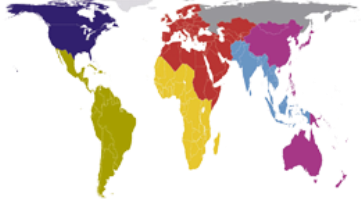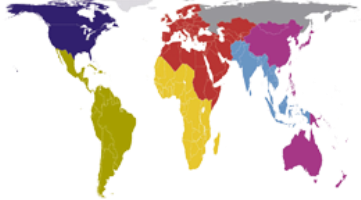COVID-19 Impact on Latin America and the Caribbean
United Church of Christ – Wider Church Ministries
Humanitarian Development Team
Coronavirus (COVID-19) Daily Briefing
Barbara T. Baylor, MPH – Temporary Health Liaison
Editor’s Note: Beginning June 1, the UCC COVID-19 Daily Briefing will go to three times a week. Barbara T. Baylor, MPH, will continue to separate facts from falsehoods and fear in articles on diverse facets of the pandemic crisis, including disparities in healthcare and health outcomes.
 Impact of COVID-19 on Latin America and the Caribbean
Impact of COVID-19 on Latin America and the Caribbean
Every one of the 33 countries in Latin America and the Caribbean have confirmed cases of COVID-19. The COVID-19 crisis brings to the fore many of the structural social problems of the region, as it hits the poorest hardest. Latin America and the Caribbean continue to face unique challenges to safeguard their societies and populations.
The Latin American country that has been affected the most by COVID-19 is Brazil. As of May 27, 2020, the country had reported more than 391,000 cases followed by Peru, with 129,751 confirmed cases of COVID-19. In total, the region has registered more than 800,000 infected persons with 43,302 deaths due to the COVID-19 pandemic in Latin America and the Caribbean.
In order to combat the spread of COVID-19, most Latin American countries have adopted measures to prevent further spread. For example, most countries have canceled massive events along with school and university classes. Also, countries like Chile and Colombia have closed their borders and restricted transit by foreign travelers.
The pandemic has also threatened to undo progress toward gender equality. The World Bank has indicated that the toll of COVID-19 on human life and the economy in Latin America and the Caribbean is giving rise once again to gender inequality and violence against women and girls.
Updated reports as of May 22 indicate that COVID-19 numbers are increasing in the Eastern Caribbean. The U.S. Department of State has issued a Global Level 4 Health Advisory advising all U.S. citizens to avoid travel to the Eastern Caribbean due to the impact of COVID-19 there.
It appears that this virus does not discriminate. Every race, gender, faith, ethnicity and nation have experienced illness and death as a result. It is a demonstration, one might suggest, of our common humanity, of our sameness. No one is immune.
Following is a backgrounder from Global Ministries, a common missional witness of the Christian Church (Disciples of Christ) and the United Church of Christ.
Latin America and the Caribbean
In Latin America and the Caribbean, our partners experience the unjust and unequal way that COVID-19 impacts communities.
The Ecumenical Foundation for Integral Development, Education and Capacity Building (FEDICE), a Global Ministries partner in Ecuador, reports that the pandemic affects indigenous communities’ access to markets to sell their products. They have difficulty purchasing items such as fertilizers, tools, or raw materials for their daily work on farms.
Cultural Guatemalan Action, another partner, says, “There is great uncertainty in the communities regarding the measures taken by the president of the republic with the lockdown. The virus is a significant concern. However, in our communities, where the economic crisis hits the most impoverished and many families live and eat their meager daily income, it is worrying to see families struggling to acquire food.”
The Christian Center for Development in Honduras reported a similar situation. “Even though people do their best to provide for their families, it is difficult to get food and supplies in urban settings.”
The COVID-19 pandemic has also been used as an opportunity to harden economic sanctions and other policies that seek regime change in countries in the region.
The Cuban Council of Churches and the National Council of Churches in the USA signed a joint statement demanding that the U.S. lift the economic, financial, and commercial blockade imposed on Cuba for over 60 years as well as sanctions imposed on other nations. They request the cessation of all manipulation and use of political and economic interests in the face of the current global health crisis, which have worsened and been made more apparent by the COVID-19 pandemic.
In Venezuela, the Evangelical Pentecostal Union of Venezuela reports how the U.S. Government chose the peak of the COVID-19 crisis to announce three different threats against Venezuela. First, the U.S. tightened economic sanctions. Second, U.S. Attorney General William Barr unsealed criminal charges of drug trafficking against the President of Venezuela, Nicolas Maduro. Third, the U.S. government announced the movement of navy warships toward Venezuela as its administration beefs up alleged counter-narcotics operations off the coast of Venezuela.
These acts from the U.S. are weaponizing the health crisis against the people of Venezuela. This increases the violations of human rights and impacts the well-being of the most vulnerable. The U.N. and other international organizations have reported that economic sanctions imposed by the U.S. against Venezuela have undermined health and food service systems over the past few years.
Related News
Growing Weary
In December 1964 during a speech in Harlem, Fannie Lou Hamer declared: “And you can always...
Read MorePlanning for Earth Month: Resources for Congregations
April is Earth Month, and for congregations, it can be a great time to further discern how...
Read MoreBodily Autonomy Means Every-BODY
Advocacy and Action for Women's and Gender Justice Local events stir thoughts and...
Read More


